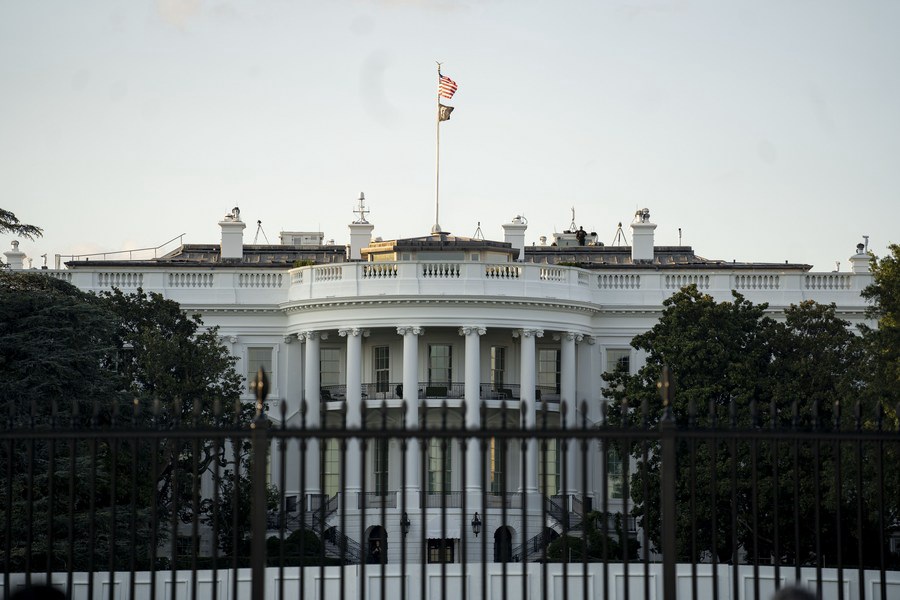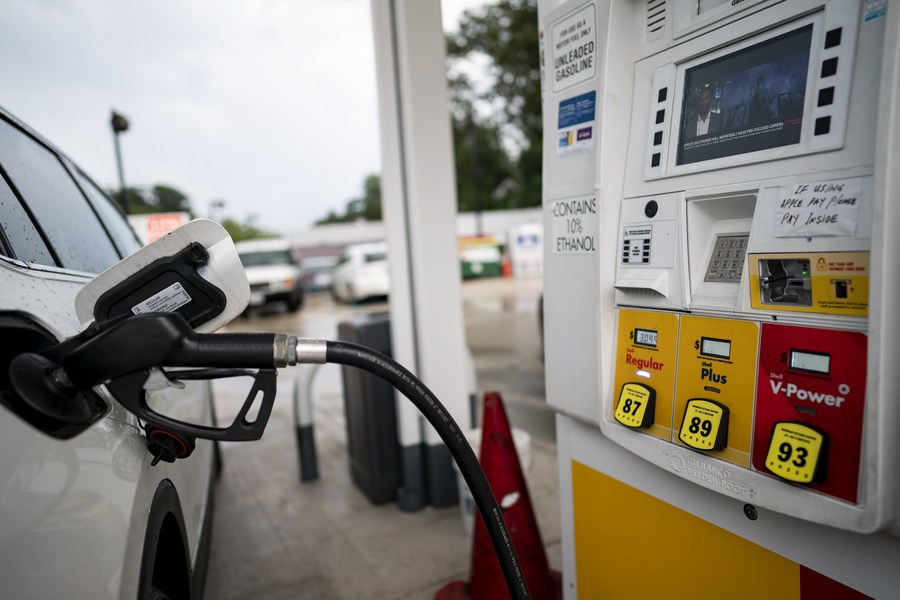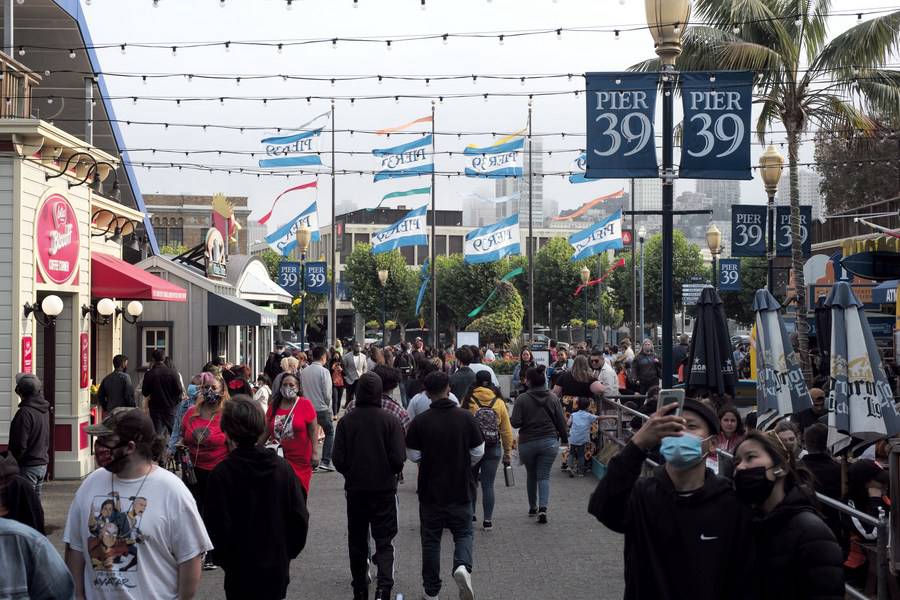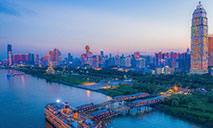U.S. administration in hot seat as inflation rises, supply chain breaks down

Photo taken on Sept. 3, 2021 shows the White House in Washington, D.C., the United States. (Xinhua/Liu Jie)
Jerome Powell, chairman of the U.S. Federal Reserve, has attributed the recent price increases to supply chain bottlenecks caused by the pandemic. With less supply, prices go up.
WASHINGTON, Oct. 15 (Xinhua) -- The U.S. administration is in the hot seat, as prices for food and multiple consumer items are rising at a rapid clip and a massive supply-chain breakdown has exploded nationwide.
Food prices overall climbed 4.6 percent since September last year, according to information published on Wednesday by the U.S. Bureau of Labor Statistics (BLS). The Consumer Price Index, a measure of changes in prices for goods and services, grew 5.4 percent from a year ago.

People shop for vegetables at a market in New York, the United States, on Oct. 13, 2021. (Xinhua)
PRICE HIKES OF DAILY GOODS
The prices of meat, eggs, fish and poultry saw a 10.5 percent increase over the past year, with beef alone skyrocketing 17 percent, according to the BLS.
All this has pushed annual inflation to the highest levels in the past 13 years.
Jerome Powell, chairman of the U.S. Federal Reserve, has attributed the recent price increases to supply chain bottlenecks caused by the pandemic. With less supply, prices go up.
The U.S. administration is pushing to fix the problem by Christmas, in a bid to ease supply chain constraints by the holiday shopping season. But that could prove to be an uphill climb, some U.S. media outlets argued.
U.S. President Joe Biden on Wednesday met with a number of industry leaders and heads of ports and unions in an effort to tackle problems within the supply chain, from shipping, warehousing to labor.
It was later announced that the port of Los Angeles would ramp up operations with a new, 24-hour, 7-day-per-week schedule.
"This is an across-the-board commitment to going to 24/7," Biden said.
Efforts to ramp up operations at the port, as well as vows from some major retailers to work around the clock to move more goods, are a big first step, said the president. "We need the rest of the private sector chain to step up as well."
But some economists said these efforts may not make the splash that Biden is looking for.
As such, Biden's record-low poll numbers may not rise anytime soon. In the latest Quinnipiac University polls, the president's approval rating was tagged at a paltry 38 percent. In Real Clear Politics' average of polls, Biden gets a 44.1 percent approval rating.
Republicans have seized on the problem to blast the Biden administration for what they describe as gross incompetence.
"Prices are rising, real wages are down, and Americans are struggling to get back to work," said Republican National Committee Chairwoman Ronna McDaniel earlier this week.
With these problems, now is not the time to ram through Washington's multi-trillion U.S. dollar social spending package, she contended.
"With consumer prices rising higher than expected and families facing the highest inflation rate in over 13 years," there could not be a worse possible time for "trillions in reckless tax hikes and spending," McDaniel said.

Photo taken on Aug. 11, 2021 shows a pump at a gas station in Arlington, Virginia, the United States. (Xinhua/Liu Jie)
A SUBSTANTIAL POLITICAL PROBLEM
This comes as Washington is beset from all sides. Both parties are lambasting the administration for its botched withdrawal from Afghanistan. Besides, the southern U.S. border is in crisis, and COVID-19 continues to cause sickness and death among those who have chosen not to be vaccinated.
While analysts have said inflation is temporary, a growing number of economists argue that prices could continue to rise longer than many Americans had expected.
Janet Coleman, a retiree in her 70s on a fixed income in the Washington DC area, told Xinhua that prices at grocery stores have gone up, although it's still manageable.
Catherine Foster, a manager in her 40s in the Washington DC area, told Xinhua that restaurant prices have gone up considerably, causing her to cook at home more. Jim Lee, in IT in the Washington DC area, told Xinhua he has noticed that prices at restaurants have risen considerably.
Still, things may not be as bad for Biden as they seem.
"Inflation has moved up but not in a big enough manner to create a substantial political problem," Brookings Institution Senior Fellow Darrell West told Xinhua.
The last president to suffer from inflation was Jimmy Carter in 1980, when inflation was much worse, West said. "We are a long way from that now."

People spend their leisure time at a pier in San Francisco, the United States, on Aug. 15, 2021. (Xinhua/Wu Xiaoling)
DEEPER LOOK INTO INFLATION
Desmond Lachman, resident fellow at the American Enterprise Institute, told Xinhua that the current rise in U.S. inflation is the result of two basic causes.
The first cause is from demand-pull factors. Those have resulted from excessively expansive monetary and fiscal policies, which increased aggregate demand, and from global supply chain problems, especially in the area of computer chips important to the automobile and appliance sector, restricting aggregate supply, Lachman said.
That has caused demand to exceed supply in the goods sector, which in turn has driven up prices, he added.
The second cause is from cost-push factors, including the big increases in international energy, metal, and food prices as well as the rise in world shipping costs. Those factors are pushing up costs that then get passed onto consumers in the form of price increases, said the expert.
This combination of demand-pull and cost-push factors, together with the very rapid rate of increase in U.S. house prices and rents, makes it "very likely" that inflation will prove to be "much longer lasting and more intractable than the Federal Reserve would have us believe," Lachman noted.
Photos
Related Stories
- 1,000 USD per fake news report -- U.S. plot to discredit Chinese investments exposed by Zimbabwean daily
- U.S. GDP growth forecasts lowered, inflation risk in limelight
- U.S. returns to UN Human Rights Council
- Gun violence kills more American children, teens: AP
- U.S. House approves short-term debt limit increase to avert default
- U.S. reaffirms COVID-19 vaccine mandates amid party-line, individual opposition
- In pics: air show of annual Fleet Week activities in San Francisco
- Compelled to part ways with Chinese suppliers, small U.S. telecom providers risk survival
- U.S. warns of "twindemic" prior to holiday season with COVID-19 pill, booster vaccines in clearance
- Chinese FM calls on UN members to pay dues to ensure normal operation of organization
Copyright © 2021 People's Daily Online. All Rights Reserved.










